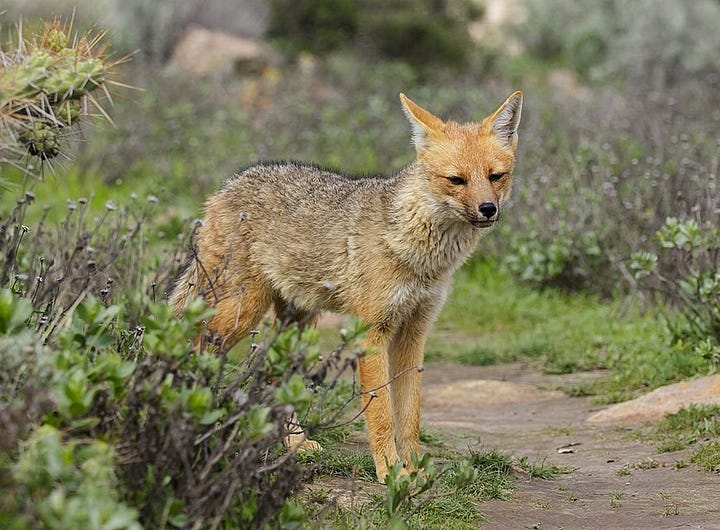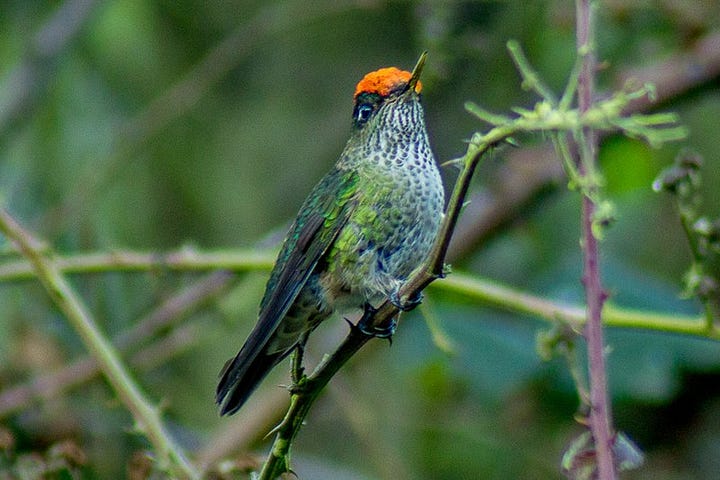A fable is a way of passing on cultural values through a story in which animals take on human roles. One of the most fascinating Yahgan fables I’ve come across is that of the fox and the hummingbird.
Here it is, as it was told to anthropologist Martin Gusinde in 1919-1920.1


Once there was a shortage of water in a region here and all the people were suffering terrible thirst.
Cunning Čilawáia [the Fuegian fox] looked around carefully and found a lagoon some distance from the campsite which contained a little water. He told nobody about it and built a solid fence around the lagoon so that no one could enter. All the time he kept himself hidden inside to make certain that no one else came near to drink. He took lots of water only for himself; and one by one he also allowed his relatives to drink from the lagoon.
After some time the other people found out that the fox had discovered a lagoon with water which allowed him to quench his thirst. Since they had all been suffering dreadfully from thirst for a long time, they went to the fox and asked him for some water. He did not even listen to their pleas, but drove them away with harsh words.
The condition of the people grew worse and worse. When they were so thirsty that they could hardly stand up, they again approached Čilawáia. They offered him nice, big pieces of meat which they wanted to exchange for water. But he remained hardhearted and did not agree to the exchange.
All the people were now really close to death. In their helplessness, they sent for little Omóra [the green-backed firecrown hummingbird], who had saved them from great distress once before. Omóra indeed came soon, for he was always ready to help others. Although he is a tiny, insignificant-looking little man, he is much braver and more daring than many a giant.

All the people complained loudly to him of their distress, saying: “We’re dying of thirst here! The fox has water, but he gives us none.” Other people sighed: “The selfish fox has built a solid fence around the lagoon; only he himself and his closest relatives can drink from it. Soon we shall perish from thirst!”
Then
Omóra became very angry with selfish Čilawáia.
He rose at once and hurried to where the fox was. He addressed him harshly: “Listen! Are things really the way the people have assured me? Here you have access to a lagoon with water, but you don’t want to share it with the other people! Soon they will all die of thirst.”
The fox jeered: “Why should I worry about other people? The lagoon contains only a little water; it’s barely enough for me and my closest kin. I can’t give any to the other people or I should soon go thirsty myself.”
Omóra became furious; without answering the fox, he hurried to the camp. He reflected briefly. Soon he rose again, took his sling, and once more went to where the fox was. On the way, he collected several sharp stones. When he got sufficiently close and caught sight of the fox, he cried threateningly to him: “Will you now at last give the people some water? Come on, don’t be so selfish; after all, they’ll soon die of thirst!”
The fox replied contemptuously: “May they all die of thirst! What do I care! I can’t give everyone water from here, or I, too, will die, along with my closest relatives!”
Now Omóra was so enraged, he could no longer control himself; furiously he swung his sling and killed the fox with his first throw.

The other people had been watching; happily they came running. They promptly broke the thick fence, approached the lagoon, and drank their fill of water. They drank so much that the whole lagoon was emptied. All were overjoyed at having been saved from death.
But a few birds came too late. They found barely a few drops with which to moisten their throats a little. All the other people had drunk so much because the long thirst had dried them out completely.
Then Síta [the horned own] and the birds that had arrived too late took the mud from the bottom of the lagoon and threw small lumps high up on the mountains. These clumps of mud caused jets of water to spurt from the mountains; large and small streams formed and a lot of water flowed to the valley below. When the people saw this they became extremely happy; they drank great quantities of the fresh, clear water, which was better than that from the lagoon, and now they were safe against thirst.
Until the present day, all those little streams are still flowing down from the mountains; they give a lot of good water indeed. Since then nobody has to die of thirst any more.
“The Selfish Fox” (narrative number 32) from Folk Literature of the Yamana Indians: Martin Gusinde’s Collection of Yamana Narratives, Johannes Wilbert, ed., vol. 40 of the UCLA Latin American Studies Series (U of California Press, Berkeley, CA: 1977). The narratives were translated from Gusinde’s German into English by Karin Simoneau. I lightly edited the paragraph breaks and added glosses.



